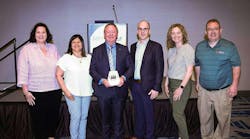Puradyn introduced a new model of its bypass oil filtration system at TMC’s annual meeting, the Model PFT60, designed to make the installation of new filters faster and easier. However, Puradyn said the real benefit of its bypass system comes in two parts – extending oil life and keeping it free from contaminants.
“Lubricating oil never wears out – it becomes contaminated. That’s why you change it and get rid of it,” said Kevin Kroger, the company’s president and COO. “Our system can remove both solid and liquid contaminants down to a quarter of a micron level.”
Kroger said that Puradyn recommends that, with new vehicles, the fleet run the initial oil to manufacturer-recommended change mileages (typically 20,000 to 30,000 miles) and then change it. The break-in oil always contains heavy metal contaminants from running in new engines and should be disposed.
The second round of oil, however, can be kept in the engine indefinitely with the Puradyn system, using its filtration and additive system. However, the company strongly recommends regular oil analysis to verify that the oil is indeed holding up.
Puradyn has some powerful testimonials to back up its claims. Thomas Harrison, district director of the Miami-Dade County Public Schools, said his school bus fleet of 1,200 vehicles saved $173,568 in 1999 by using the Puradyn system. Vulcan Chemicals installed Puradyn units on five of its tractors in 1992 for a six-month test and said it achieved payback in one year by reducing new oil and disposal costs. The company now uses the system on all 34 of its trucks.
Puradyn’s Kroger also said the advent of EGR technology to reduce engine emissions will make such bypass oil filtration systems even more critical.
“Higher soot levels in the engine means more frequent oil changes,” he said. “We know for sure we have a system out there that can take care of that problem.”


